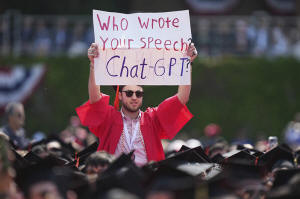College graduates face toughest job market in more than a decade as
hiring slows
[June 26, 2025] By
CHRISTOPHER RUGABER
WASHINGTON (AP) — While completing a master’s degree in data analysis,
Palwasha Zahid moved from Dallas to a town near Silicon Valley. The
location made it easy to visit the campuses of tech stalwarts such as
Google, Apple, and Nvidia.
Zahid, 25, completed her studies in December, but so far she hasn't
found a job in the industry that surrounds her.
“It stings a little bit,” she said. “I never imagined it would be this
difficult just to get a foot in the door.”
Young people graduating from college this spring and summer are facing
one of the toughest job markets in more than a decade. The unemployment
rate for degree holders ages 22 to 27 has reached its highest level in a
dozen years, excluding the coronavirus pandemic. Joblessness among that
group is now higher than the overall unemployment rate, and the gap is
larger than it has been in more than three decades.
The rise in unemployment has worried many economists as well as
officials at the Federal Reserve because it could be an early sign of
trouble for the economy. It suggests businesses are holding off on
hiring new workers because of rampant uncertainty stemming from the
Trump administration's tariff increases, which could slow growth.
“Young people are bearing the brunt of a lot of economic uncertainty,”
Brad Hersbein, senior economist at the Upjohn Institute, a labor-focused
think tank, said. “The people that you often are most hesitant in hiring
when economic conditions are uncertain are entry-level positions.”

The growth of artifical intelligence may be playing an additional role
by eating away at positions for beginners in white-collar professions
such as information technology, finance, and law.
Higher unemployment for younger graduates has also renewed concerns
about the value of a college degree. More workers than ever have a
four-year degree, which makes it less of a distinguishing factor in job
applications. Murat Tasci, an economist at JPMorgan, calculates that 45%
of workers have a four-year degree, up from 26% in 1992.
While the difficulty of finding work has demoralized young people like
Zahid, most economists argue that holding a college degree still offers
clear lifetime benefits. Graduates earn higher pay and experience much
less unemployment over their lifetimes.
The overall U.S. unemployment rate is a still-low 4.2%, and the
government's monthly jobs reports show the economy is generating modest
job gains. But the additional jobs are concentrated in health care,
government, and restaurants and hotels. Job gains in professions with
more college grads, such as information technology, legal services, and
accounting have languished in the past 12 months.
The unemployment rate has stayed low mostly because layoffs are still
relatively rare. The actual hiring rate — new hires as a percentage of
all jobs — has fallen to 2014 levels, when the unemployment rate was
much higher, at 6.2%. Economists call it a no-hire, no-fire economy.
For college graduates 22 to 27 years old, the unemployment rate was 5.8%
in March — the highest, excluding the pandemic, since 2012, and far
above the nationwide rate.
Lexie Lindo, 23, saw how reluctant companies were to hire while applying
for more than 100 jobs last summer and fall after graduating from Clark
Atlanta University with a business degree and 3.8 GPA. She had several
summer internships in fields such as logistics and real estate while
getting her degree, but no offer came.
“Nobody was taking interviews or responding back to any applications
that I filled out,” Lindo, who is from Auburn, Georgia, said. "My resume
is full, there’s no gaps or anything. Every summer I’m doing something.
It’s just, ‘OK, so what else are you looking for?’”
She has returned to Clark for a master's program in supply chain studies
and has an internship this summer at a Fortune 500 company in Austin,
Texas. She's hopeful it will lead to a job next year.

[to top of second column] |

A person in a graduation cap and gown holds a sign during an address
by David Zaslav, president and CEO of Warner Bros. Discovery, at
Boston University commencement ceremonies, May 21, 2023, in Boston.
(AP Photo/Steven Senne, file)
 Artificial intelligence could be a
culprit, particularly in IT. Matthew Martin, senior U.S. economist
at Oxford Economics, has calculated that employment for college
graduates 28 and above in computer science and mathematical
occupations has increased a slight 0.8% since 2022. For those ages
22 to 27, it has fallen 8%, according to Martin.
Company announcements have further fueled concerns. Tobi Lutke, CEO
of online commerce software company Shopify, said in an April memo
that before requesting new hires, “teams must demonstrate why they
cannot get what they want done using AI.”
Last week, Amazon CEO Andy Jassy said AI would likely reduce the
company's corporate work force over the next few years.
“We will need fewer people doing some of the jobs that are being
done today, and more people doing other types of jobs,” Jassy said
in a message to employees. “We expect that this will reduce our
total corporate workforce as we get efficiency gains from using AI
extensively across the company.”
Zahid worries that AI is hurting her chances. She remembers seeing
big billboard ads for AI at the San Francisco airport that asked,
“Why hire a human when you could use AI?”
Still, many economists argue that blaming AI is premature. Most
companies are in the early stages of adopting the technology.
Professional networking platform LinkedIn categorized occupations
based on their exposure to AI and did not see big hiring differences
between professions where AI was more prevalent and where it wasn't,
said Kory Kantenga, the firm's head of economics for the Americas.
“We don’t see any broad-based evidence that AI is having a
disproportionate impact in the labor market or even a
disproportionate impact on younger workers versus older workers,”
Kantenga said.
He added that the Federal Reserve's interest rate hikes have also
slowed hiring in tech. Many IT firms expanded when the Fed pinned
its short-term rate at nearly zero after the pandemic. In 2022, the
Fed began cranking up rates to combat inflation, which made it
harder to borrow and grow.

In fact, IT's hiring spree when rates were low — fueled by millions
of Americans ramping up their online shopping and video conferencing
— left many firms with too many workers, economists say.
Cory Stahle, an economist at the job-listings website Indeed, says
postings for software development jobs, for example, have fallen 40%
compared with four years ago. It's a sharp shift for students who
began studying computer science when hiring was near its peak.
Zahid, who lives in Dublin, California, has experienced this
whiplash firsthand. When she entered college in 2019, her father,
who is a network engineer, encouraged her to study IT and said it
would be easy for her to get a job in the field.
She initially studied psychology but decided she wanted something
more hands-on and gravitated to data analysis. Her husband, 33, has
a software development job, and friends of hers in IT received
immediate job offers upon graduation a few years ago. Such rapid
hiring seems to have disappeared now, she said.
She has her college diploma, but hasn't hung it up yet.
“I will put it up when I actually get a job, confirming that it was
worth it all,” she said.
___
AP Writer Matt Sedensky in New York contributed to this report.
All contents © copyright 2025 Associated Press. All rights reserved |